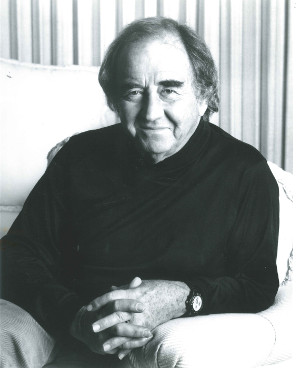William Kraft
(b. Sep 6, 1923)

Born on Sept. 23, 1923 in Chicago, Illinois, William Kraft grew up in San Diego and joined the United States Air Force for three years in the later part of World War II. He received his bachelor’s degree cum laude in 1951 and his master’s degree in 1954 from Columbia University, where he was awarded two Anton Seidl Fellowships. His principal instructors were Jack Beeson, Seth Bingham, Henry Brant, Henry Cowell, Erich Hertzmann, Paul Henry Lang, Otto Luening, and Vladimir Ussachevsky. He studied percussion with Morris Goldenberg, timpani with Saul Goodman, and conducting with Rudolph Thomas and Fritz Zweig.
During his years in New York, Kraft was active as a freelance musician and was an extra percussionist for the Metropolitan Opera. In 1954, Kraft joined the Dallas Symphony. After one season there, he moved to Los Angeles.
He became a member of the Los Angeles Philharmonic beginning in the 1955/56 season. He spent his first eight years as a member of the percussion section, and the remaining 17 years as principal timpanist. Kraft was also the assistant conductor of the orchestra for three seasons under Zubin Mehta. From 1981–85, Kraft was Composer-in-Residence for the orchestra, during which time he was also responsible for the founding and directing of the Los Angeles Philharmonic New Music Group.
During his early years in Los Angeles, Kraft organized and directed the Los Angeles Percussion Ensemble, a group that played a vital part in premieres and recordings of works by such composers as Ginastera, Harrison, Krenek, Stravinsky, and Varèse. Kraft served as Stravinsky’s timpanist and percussionist in charge of all percussion activities for the composer’s Los Angeles performances and recordings. As a percussion soloist, he performed in the American premieres of Stockhausen’s “Zyklus” and Boulez’s “Le Marteau sans Maître,” in addition to recording “Histoire du Soldat” under Stravinsky’s direction.
Kraft received numerous awards, including two Kennedy Center Friedheim Awards, two Guggenheim Fellowships, two Ford Foundation commissions, fellowships from the Huntington Hartford Foundation and the National Endowment for the Arts, the American Academy and Institute of Arts and Letters Music Award, the ASCAP Award, and the NACUSA Award. In October 2009, Kraft was given The Forte Award for distinguished achievement in advancing modern music in Los Angeles.
As a composer, he received commissions from the Library of Congress, the U.S. Air Force Band, the St. Paul Chamber Orchestra, the Kronos Quartet, Voices of Change, the Schoenberg Institute, the consortium of Speculum Musicae/San Francisco Contemporary Music Players/Contemporary Music Forum, the Boston Pops, the consortium of Pacific Symphony/Spokane Symphony/Tucson Symphony, and the Los Angeles Philharmonic, among others. He also composed film soundtracks, including the scores to Psychic Killer (1975), Avalanche (1978), Bill (1981), and Fire and Ice (1983).
In the 1960s and 1970s, most of Kraft's compositions were serial, while in the 1980s he incorporated jazz rhythms and impressionist harmonies. Percussion works feature prominently in his catalog, and several of his notable pieces were introduced during the annual Percussive Arts Society International Convention (PASIC) over the years. In 1996–98 he concentrated on composing his first opera, “Red Azalea.” Kraft’s “Contextures: Riots – Decade ’60” (1967) was choreographed and performed by the Scottish National Ballet and the Minnesota Dance Company. In 1986, United Air Lines commissioned a work to accompany a lumetric sculpture by Michael Hayden titled “Sky’s the Limit” for their pedestrian passageway at Chicago O’Hare International Airport. His “Concerto for English Horn and Orchestra,” commissioned by the Los Angeles Philharmonic, was premiered in January 2003. In 2005, Kraft’s “Concerto No. 2 for Timpani: The Grand Encounter,” commissioned by the San Francisco Symphony Orchestra, was premiered under conductor Michael Tilson Thomas with David Herbert as soloist. A revised version of the concerto was premiered in the spring of 2007 by the Hong Kong Philharmonic, conducted by Xian Zhang, with soloist James Boznos; later the same year, David Herbert gave the first U.S. performance at PASIC in Columbus, Ohio, with the Akron Symphony. Later works include “Brazen,” commissioned by the San Francisco Symphony Orchestra, and “Concerto for Four Percussion Soloists” for symphonic wind ensemble, premiered and recorded by the New England Conservatory Wind Ensemble.
Compact discs completely devoted to Kraft’s music can be found on the Harmonia Mundi, CRI, Cambria, Albany, Crystal, and Nonesuch labels. Other works can be found on GM, Crystal, London Decca, and Neuma. In February 2007, The Southwest Chamber Music Society embarked on a project to perform and record 14 of the 15 “Encounters” pieces.
Kraft served as chairman of the composition department and holder of the Corwin Chair at the University of California, Santa Barbara from 1991 until June 2002.
William Kraft died on February 12, 2021.